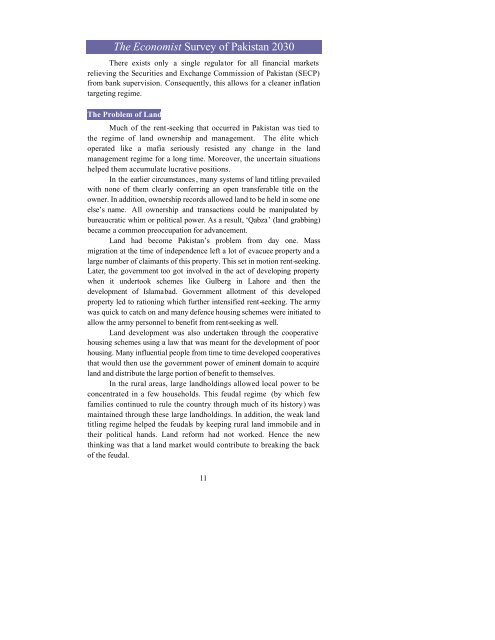economist-survey
economist-survey
economist-survey
Create successful ePaper yourself
Turn your PDF publications into a flip-book with our unique Google optimized e-Paper software.
The Economist Survey of Pakistan 2030<br />
There exists only a single regulator for all financial markets<br />
relieving the Securities and Exchange Commission of Pakistan (SECP)<br />
from bank supervision. Consequently, this allows for a cleaner inflation<br />
targeting regime.<br />
The Problem of Land<br />
Much of the rent-seeking that occurred in Pakistan was tied to<br />
the regime of land ownership and management. The élite which<br />
operated like a mafia seriously resisted any change in the land<br />
management regime for a long time. Moreover, the uncertain situations<br />
helped them accumulate lucrative positions.<br />
In the earlier circumstances , many systems of land titling prevailed<br />
with none of them clearly conferring an open transferable title on the<br />
owner. In addition, ownership records allowed land to be held in some one<br />
else’s name. All ownership and transactions could be manipulated by<br />
bureaucratic whim or political power. As a result, ‘Qabza’ (land grabbing)<br />
became a common preoccupation for advancement.<br />
Land had become Pakistan’s problem from day one. Mass<br />
migration at the time of independence left a lot of evacuee property and a<br />
large number of claimants of this property. This set in motion rent-seeking.<br />
Later, the government too got involved in the act of developing property<br />
when it undertook schemes like Gulberg in Lahore and then the<br />
development of Islamabad. Government allotment of this developed<br />
property led to rationing which further intensified rent-seeking. The army<br />
was quick to catch on and many defence housing schemes were initiated to<br />
allow the army personnel to benefit from rent-seeking as well.<br />
Land development was also undertaken through the cooperative<br />
housing schemes using a law that was meant for the development of poor<br />
housing. Many influential people from time to time developed cooperatives<br />
that would then use the government power of eminent domain to acquire<br />
land and distribute the large portion of benefit to themselves.<br />
In the rural areas, large landholdings allowed local power to be<br />
concentrated in a few households. This feudal regime (by which few<br />
families continued to rule the country through much of its history) was<br />
maintained through these large landholdings. In addition, the weak land<br />
titling regime helped the feudals by keeping rural land immobile and in<br />
their political hands. Land reform had not worked. Hence the new<br />
thinking was that a land market would contribute to breaking the back<br />
of the feudal.<br />
11




